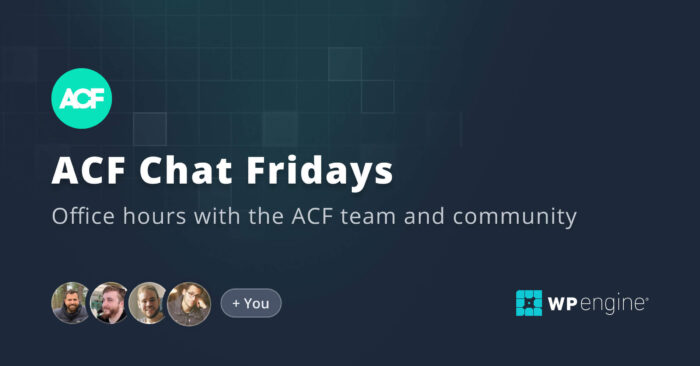ACF Chat Fridays is our open office hours with the ACF team and users, answering questions and digging into the best way to build WordPress sites with ACF. Read on for highlights from the latest session.
The September 29th session dug into the specifics of improvements coming to ACF Blocks in ACF 6.3, as well as a discussion of possible ways to improve ACF, page builders, and some of the best WordPress resources on Facebook.
Co-hosted by Iain Poulson, Matt Shaw, Anthony Burchell, and Brian Hardie.
Sign up for the next session →

Session Recording
Catch the highlights in the session summary, or watch the entire session in the player below.
Session Summary
Iain Poulson started the latest session with a recap of recent news, including the ongoing work on the next major release of ACF. In addition to other new features and enhancements, ACF 6.3 is expected to include a number of improvements to ACF Blocks.
ACF Blocks is a feature of ACF PRO that makes it very simple to create new WordPress compatible blocks that can use ACF fields. During the session, Iain outlined three improvements coming to ACF Blocks in 6.3.
The first is field validation for fields contained within ACF Blocks. Many ACF fields allow you to set parameters for the input they will accept, and reject any input that falls outside those parameters. Historically, this validation wasn’t available for fields included in ACF Blocks. This will change with the release of ACF 6.3.
The second new feature involves how field data is saved in ACF Blocks. When you create an ACF Block and add content to it in the content editor, the field data in that block is saved the same way WordPress saves the rest of the block editor information: to the post content column in the post table. However, some users would prefer to store the data from their ACF Blocks in post meta, like classic ACF fields do. We’re working on toggles to give you control over where that field data is saved when you create the block. This should make it easier to access this data for sorting and querying.
Third, ACF 6.3 will include a new feature to help headless users create frontend components with ACF. ACF Blocks are basically two files: block.json, which tells WordPress how to configure the block, and a PHP template file that renders the output. Starting with 6.3, headless builders will be able to use their frontend components in the editor, instead of having to create a PHP template that is otherwise unused.
From there, the open forum ventured into ways that ACF could be improved, and then into a larger discussion about current trends in page builders and how they treat blocks, groups and resources, and some of the recent news around the Ollie theme.
Resources & Links
We share relevant resources during the call. We’ll sum them up here and try to provide a bit of context:
- ACF on Twitter
- ACF Emails and News
- Sign up for ACF Beta News
- ACF’s Feedback Page
- The Admin Bar Facebook Group
- ACF Views
Coming Up on ACF Chat Fridays
Join us on October 13th for the next session of ACF Chat Fridays. The session will take place at 2pm GMT. The following session on October 27th will feature special guest Jason Bahl, creator of the WPGraphQL plugin! This plugin provides an extensible GraphQL schema and API for any WordPress site, allowing you to separate your CMS from your presentation layer. Combined with ACF, it becomes an ideal solution for creating headless WordPress sites.
What do you think we should cover at our sessions in November, December, and throughout 2024? Let us know on Twitter.
Sign up for the next session of ACF Chat Fridays here:
https://wpeng.in/acf-chat-fridays/
The list of upcoming sessions is below. You can watch the September 29th session on YouTube.
- October 13, 2023
- October 27, 2023
- November 10, 2023
- November 24, 2023
Tag or DM us on Twitter to let us know you’ll be there. Suggest new topics, let us know what you’d like to see, and send us feedback with #ACFChatFridays on Twitter.




For plugin support, please contact our support team directly, as comments aren't actively monitored.